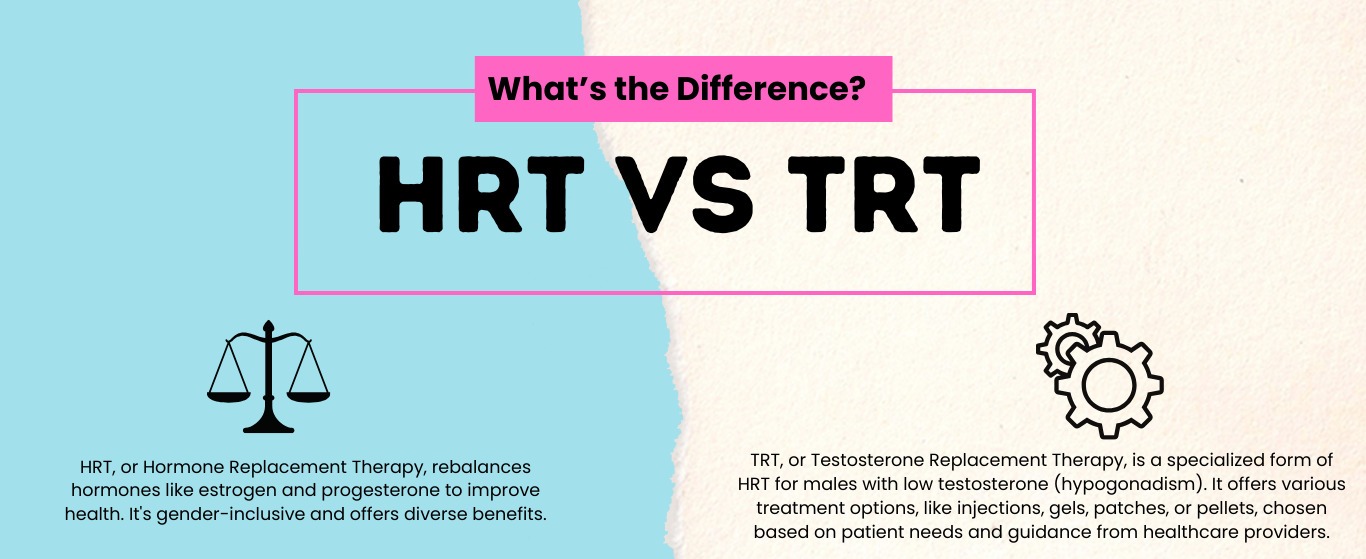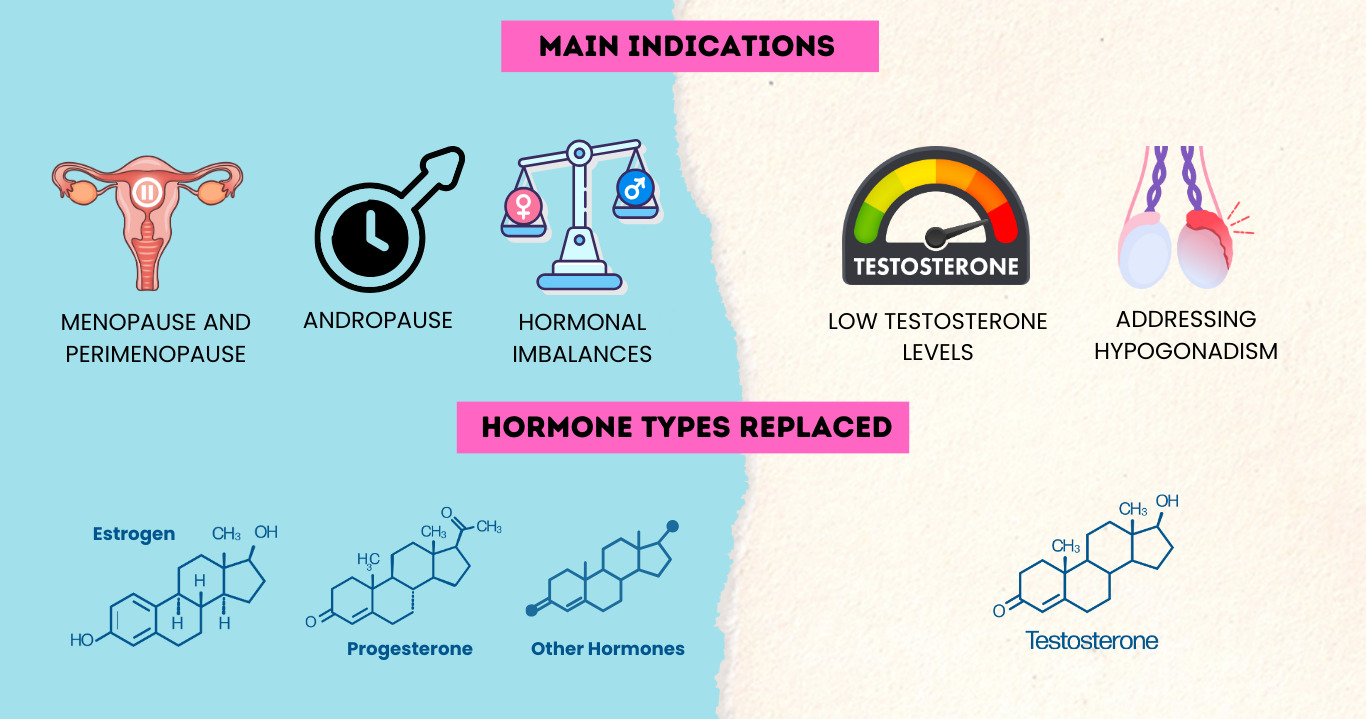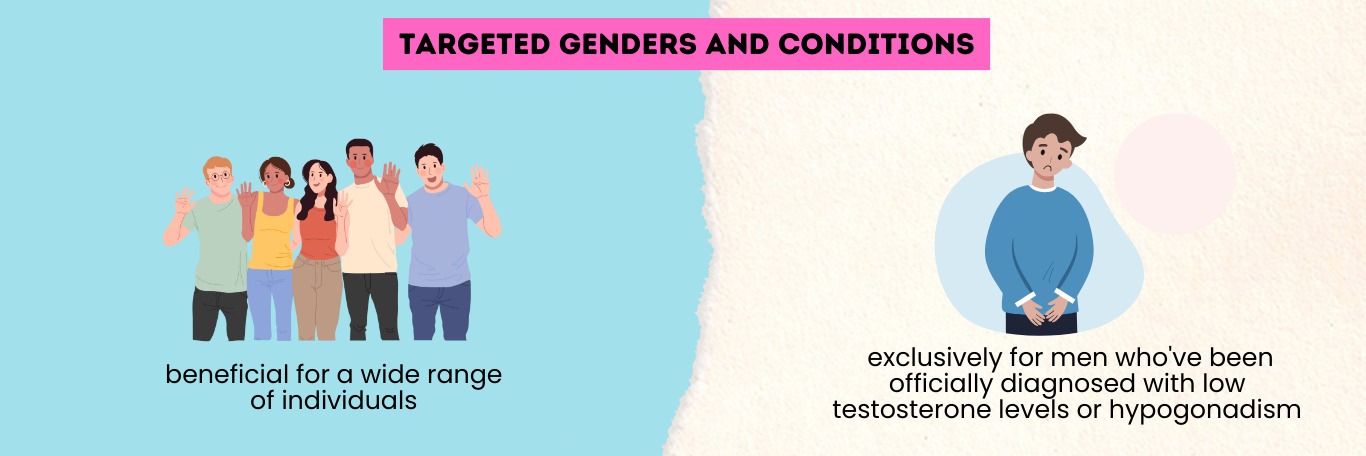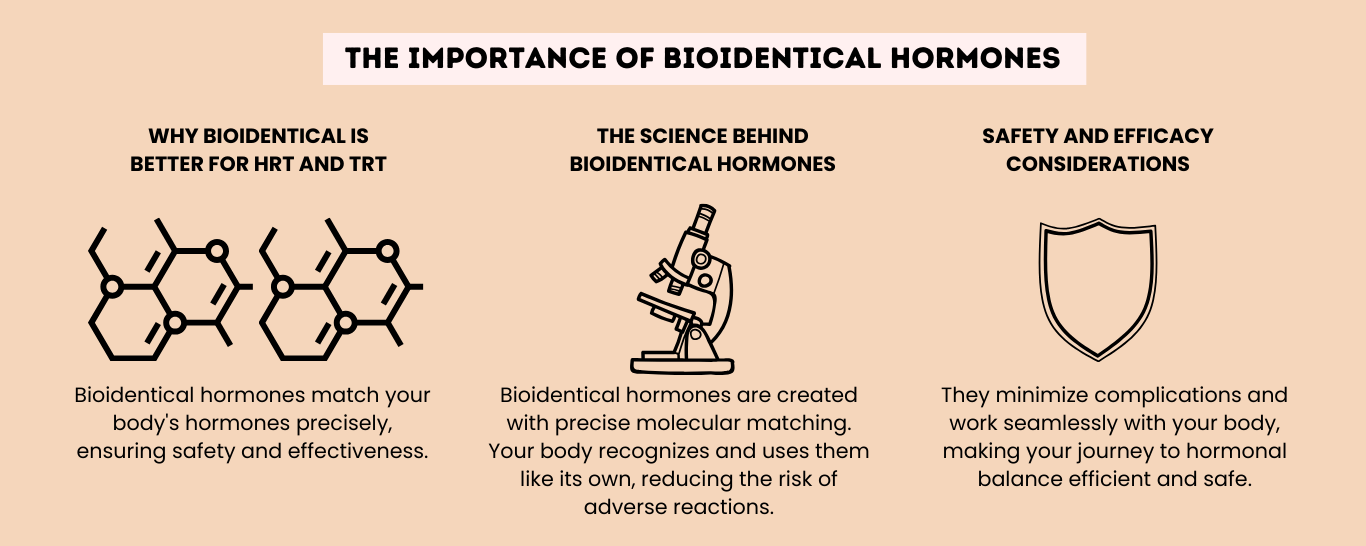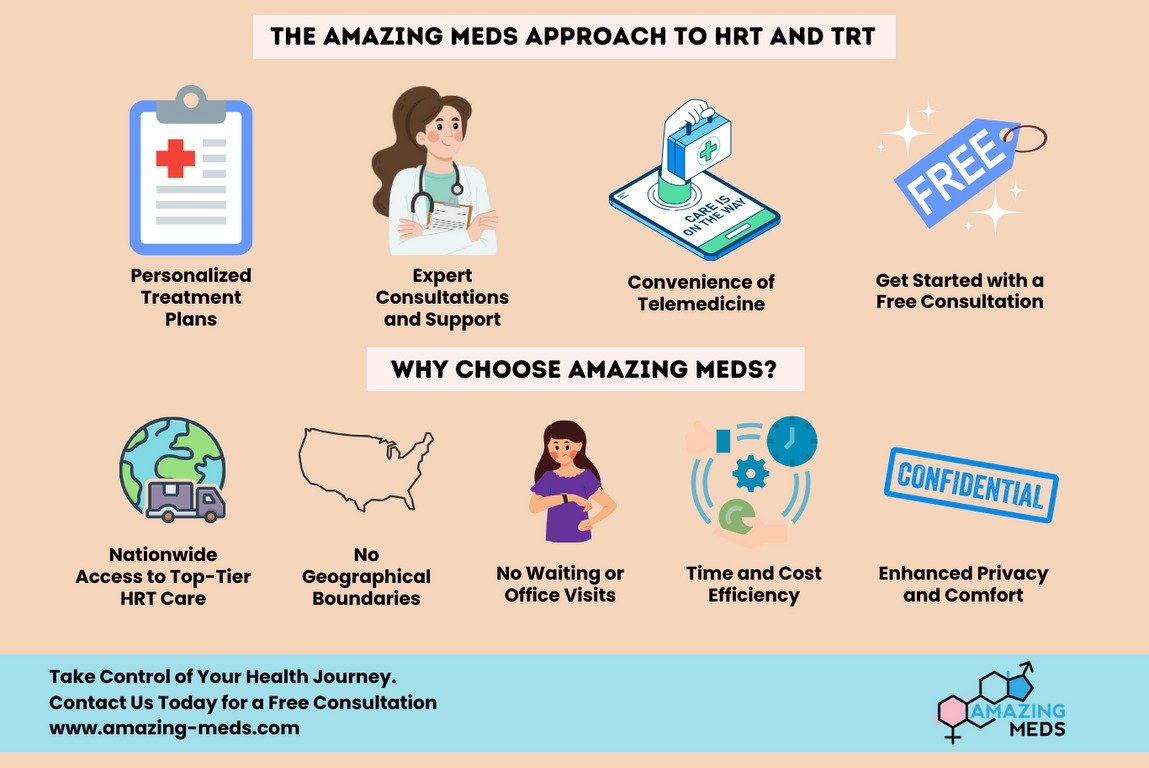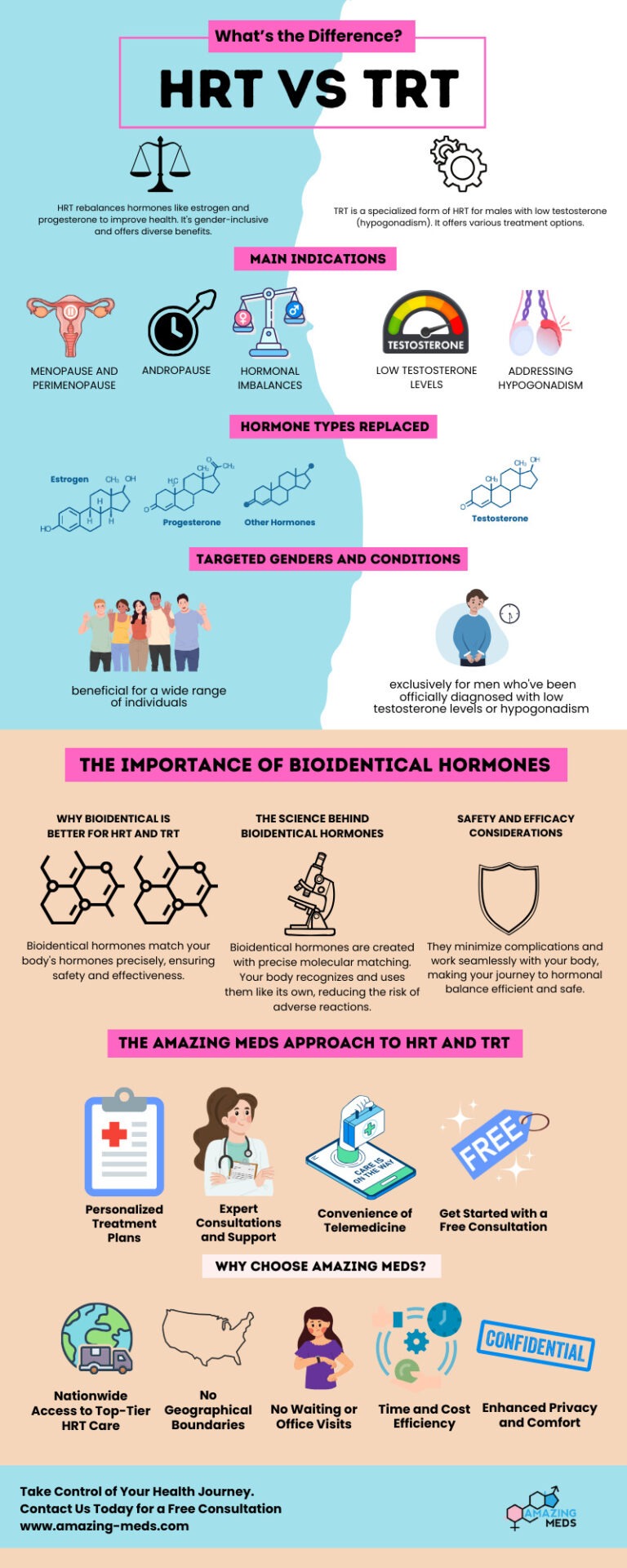When it comes to Hormone Replacement Therapy (HRT) and Testosterone Replacement Therapy (TRT), the line between them might seem blurry to many. Both aim to address hormonal imbalances and improve quality of life, but the key question remains: What’s the difference between HRT and TRT?
What precisely sets HRT and TRT apart, and how can you determine which is the better fit for your unique needs? In this comprehensive guide, we’ll delve into the details, explain the nuances, and help you understand which therapy might be right for you.
Hormone Replacement Therapy (HRT)
What is HRT?
Hormone Replacement Therapy, commonly known as HRT, is a medical intervention designed to rebalance the body’s hormonal levels. It involves replacing hormones, such as estrogen and progesterone, in individuals whose hormone levels have decreased or become imbalanced. It’s important to emphasize that HRT is not limited to one gender; it offers diverse benefits across the spectrum of human health.
Main Indications for HRT
1. Menopause and Perimenopause
HRT serves as a lifeline for women navigating the challenging phases of menopause and perimenopause. The symptoms experienced during this time, such as hot flashes, mood swings, and vaginal dryness, can significantly impact the quality of life. HRT can provide relief and restore comfort to make this transition smoother.
2. Andropause
Hormonal imbalances aren’t exclusive to women. Men too encounter their version of a midlife shift, known as andropause. HRT can be an effective solution for men experiencing low testosterone and its associated symptoms, which may include fatigue, reduced libido, and mood fluctuations.
3. Hormonal Imbalances
Hormonal imbalances don’t discriminate by gender or age. They can disrupt the lives of anyone, causing a spectrum of symptoms. HRT is a personalized solution, tailored to each individual’s unique needs, aimed at restoring equilibrium and a sense of overall well-being. It’s about finding that sweet spot where your body operates at its best.
In each of these scenarios, Hormone Replacement Therapy serves as a precise, personalized approach to help individuals regain their vitality and improve their quality of life. Whether you’re navigating the complexities of menopause, andropause, or any hormonal imbalance, HRT can be your path to relief and well-being.
Testosterone Replacement Therapy (TRT)
What is TRT?
Testosterone Replacement Therapy, often referred to as TRT, is a specialized branch of Hormone Replacement Therapy. It’s primarily intended for individuals who identify as male and are experiencing low testosterone levels, a condition known as hypogonadism.
TRT can take different forms, including injections, gels, patches, or implantable pellets. The choice of method depends on factors like patient preferences, medical history, and the guidance of healthcare providers.
Main Indications for TRT
1. Low Testosterone Levels
Low testosterone levels, associated with hypogonadism, can affect physical and emotional well-being. Symptoms may include reduced muscle mass, decreased bone density, fatigue, mood swings, diminished libido, and even cognitive changes. TRT is aimed at alleviating these symptoms by raising testosterone levels back to the normal range.
2. Addressing Hypogonadism
Hypogonadism is a condition where the body’s testes don’t produce enough testosterone. This can be due to various factors like aging, injury, or underlying medical conditions. TRT offers a tailored solution, striving to restore hormonal balance and enhance overall health.
Moreover, TRT is a highly individualized treatment. Healthcare providers determine the right dosage and administration method for each patient based on their specific needs and medical history.
In a nutshell, Testosterone Replacement Therapy is a personalized approach to help men regain vitality, manage the effects of low testosterone, and improve their well-being. Whether you’re dealing with low testosterone or hypogonadism, TRT provides a pathway to rejuvenation and an enhanced quality of life, customized to suit your unique circumstances.
Differences Between HRT and TRT
Hormone Types Replaced
1. HRT: Estrogen, Progesterone, and More
Hormone Replacement Therapy (HRT) is like a complete toolbox for hormonal balance. It includes important hormones like estrogen and progesterone, each with specific roles. Estrogen, known for its role in female reproductive health, also helps maintain strong bones and balanced moods. Progesterone complements estrogen, regulating menstrual cycles and supporting pregnancy.
But HRT isn’t limited to these – it can also include additional hormones like DHEA and testosterone when needed. This versatility makes HRT a suitable solution for both women and men dealing with a variety of hormonal issues.
2. TRT: Testosterone
Testosterone Replacement Therapy (TRT) takes a more focused approach, aiming directly at boosting testosterone levels in individuals who identify as male. Testosterone is often referred to as the “male” hormone, and for a good reason. It’s responsible for things like maintaining muscle mass, keeping your bones sturdy, managing your mood, and ensuring your sexual function runs smoothly.
Low testosterone levels can lead to a range of issues, from weaker muscles to mood swings and sexual difficulties. TRT steps in to fix these issues by directly increasing testosterone levels back to a healthy range.
Targeted Genders and Conditions
Who Benefits from HRT?
HRT is an inclusive solution, serving different groups. It’s especially helpful for women going through menopause, where estrogen levels drop, causing distressing symptoms like hot flashes and mood swings.
HRT is also a lifeline for men experiencing andropause, characterized by low testosterone levels that can lead to fatigue, reduced libido, and mood swings. Moreover, HRT can be customized for anyone, regardless of gender or age, who’s facing hormonal imbalances, which can lead to various symptoms affecting their overall well-being.
Who Benefits from TRT?
TRT is designed exclusively for men who’ve been officially diagnosed with low testosterone levels or hypogonadism. These conditions often result in symptoms like decreased muscle mass, reduced bone density, mood swings, and sexual dysfunction. TRT zeroes in on this specific issue, working to boost testosterone levels and provide targeted relief for men navigating the challenges of hormonal imbalances.
In summary, HRT offers a broad approach, addressing a spectrum of hormones with different roles in your body. It is adaptable and suitable for both women and men with various hormonal needs.
On the other hand, TRT focuses directly on replenishing testosterone, with a primary focus on men experiencing low testosterone levels. While they take different routes, both HRT and TRT share the goal of restoring hormonal balance and enhancing the quality of life for those dealing with hormonal imbalances.
The Importance of Bioidentical Hormones
Why Bioidentical is Better for HRT and TRT
When it comes to Hormone Replacement Therapy (HRT) and Testosterone Replacement Therapy (TRT), the choice of hormones matters significantly. Bioidentical hormones offer a crucial advantage. These hormones are meticulously designed to precisely match the molecular structure of the hormones naturally produced by your body, and this is more than just a scientific detail—it’s the key to safety and effectiveness.
Bioidentical hormones are the closest thing to nature’s recipe for hormonal balance. Because they’re molecular twins to your body’s own hormones, they integrate seamlessly into your system, reducing the risk of side effects. This means you’re not introducing foreign substances into your body; you’re replenishing what’s missing with an exact match.
The Science Behind Bioidentical Hormones
The creation of bioidentical hormones is a precise and sophisticated process. It involves replicating the molecular structure of hormones, ensuring they match your body’s natural hormones down to the last atom. This scientific precision is what makes bioidentical hormones a safer and more effective choice.
When you use bioidentical hormones, your body recognizes them as its own. This recognition ensures that they are metabolized and utilized just as your natural hormones would be, providing a harmonious and stable hormone balance. This scientific approach minimizes the risk of adverse reactions, making bioidentical hormones a trusted choice. For a more detailed understanding of the advantages of bioidentical hormones, see our guide on BHRT vs HRT.
Safety and Efficacy Considerations
Bioidentical hormones have earned their reputation for safety and efficacy. By aligning with your body’s chemistry, they offer a more harmonious hormonal balance. This not only enhances their effectiveness in addressing the symptoms of hormonal imbalance but also reduces the risk of complications that can be associated with synthetic hormones.
The safety profile of bioidentical hormones is a result of their ability to work in synergy with your body’s own hormone production and utilization processes. This natural compatibility is the cornerstone of their effectiveness, ensuring that your journey towards hormonal balance is both safe and efficient.
In essence, choosing bioidentical hormones for HRT and TRT is a wise decision. It’s like using the right tools to fix something—a simple and effective way to help your body feel its best. Your body welcomes them, your hormones find their balance, and you experience the benefits without any unexpected issues. It’s a choice that brings you closer to a healthier, more balanced you. For a deeper dive into this bioidentical form of hormone therapy, see our guide on what bioidentical hormone replacement therapy is.
The Amazing Meds Approach to HRT and TRT
1. Personalized Treatment Plans
At Amazing Meds, we understand that each person is unique. We believe that one size does not fit all when it comes to Hormone Replacement Therapy (HRT) and Testosterone Replacement Therapy (TRT). That’s why we create personalized treatment plans that are tailored to your specific needs. Your journey to hormonal balance starts with a plan that’s as individual as you are. This means you get the treatment that’s not just right but perfect for you.
2. Expert Consultations and Support
Our team of experienced medical practitioners is with you every step of the way on your hormone replacement journey. We’re not just healthcare providers; we’re your trusted advisors. Whether you have questions, need guidance, or simply seek support, we’re here to ensure your path to hormonal wellness is smooth and well-informed.
3. Convenience of Telemedicine
We get it; life can be hectic. That’s why we’ve made accessing the care you need as convenient as possible. With our online telemedicine HRT services, you can consult with our certified medical practitioners without the need for office visits or long wait times. Your healthcare should fit into your life, not disrupt it. We bring the expertise to you, wherever you are.
Why Choose Amazing Meds?
- Nationwide Access to Top-Tier HRT Care: No matter where you are in the country, you can access our expertise. Our nationwide reach ensures that you have access to top-tier HRT care, delivered by experienced medical professionals.
- No Geographical Boundaries: Our telemedicine-based approach breaks down geographical barriers. Regardless of your location, there are no limits to who we can help. We serve you wherever you are, ensuring that distance is never an obstacle to receiving quality HRT care.
- No Waiting or Office Visits: We eliminate the hassle of long wait times and office visits. Our program is designed to be as efficient as possible. With online telemedicine TRT and HRT programs, you can consult with our certified medical practitioners remotely, eliminating the need for in-person visits and reducing waiting times.
- Time and Cost Efficiency: We understand that healthcare costs can be a concern. Our goal is to provide an efficient and affordable solution. By eliminating the need for office visits and reducing travel time, you can save both time and money while receiving top-tier HRT care.
- Enhanced Privacy and Comfort: Your comfort and confidentiality are our top priorities. We understand that discussing and addressing hormonal health concerns can be a private matter. That’s why we prioritize your comfort, ensuring that your consultations and treatment are conducted discreetly and in the comfort of your own space.
Don’t wait any longer; take that first step towards a healthier, more balanced you. Contact Amazing Meds today and start your journey to hormonal balance. Your well-being matters, and we’re here to support you every step of the way.
Click on the following link to get in touch: https://amazing-meds.com/contact-us/

